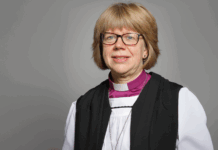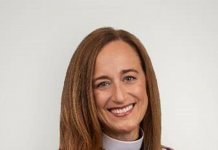It such a time as this, and during this holy season of Lent, we are mindful of the Good Shepherd, who laid down his life for his sheep. We are holding all who are anxious, all who are unwell, and all who are grieving in our prayers, asking that the presence of the risen Christ may be near to us, wherever we may be, throughout the difficult months ahead.
We are issuing this pastoral declaration in light of new governmental advice on Coronavirus (COVID-19). On the evening of Monday 16 March 2020 the Prime Minister advised that all non-essential social contact and all unnecessary travel should cease. During questions in the House of Commons the Secretary of State for Health and Social Care confirmed that the guidance relating to non-essential social contact includes faith groups and religious gatherings.
Public Worship and Gatherings
All church services and gatherings for public worship should no longer take place. This includes regular Sunday services and weekday services, as well as occasional offices (save as set out below). Study groups and other parochial events that gather people together should also no longer take place. We are awaiting further information from the government, which will help us all to measure and reflect upon the gravity and potential duration of this cessation. However, given the information we have available to us at present, the ceasing of public worship and gathering is the prudent course of action.
Vestry Meetings should not take place for the time being. Detailed guidance will follow as soon as possible.
Baptism
Baptism is the Church’s hope-filled sign and seal of new birth in Christ. It is vital that baptism continues to be offered to all. Given the guidance on cancellation of public worship, baptisms will no longer take place in the context of regular worship. Baptisms should take place in the presence of no more than ten people (the minister, the candidate and up to eight others including parents/guardians and godparents).
For infant baptism it is preferable that the candidate be held by their parent/guardian rather than the minister. Where available a baptismal shell should be used to pour water. Full immersion baptism should not be used.
Weddings
Unless the government changes the law, the common law right of parishioners and those with a qualifying connection to be married in a parish church remains. However, the date, time and other arrangements are, legally speaking, for the minister to determine. Weddings scheduled until 31 July 2020 should be postponed and any fees already paid refunded. Couples with a later wedding date should be free to cancel/rearrange without financial penalty.
If for pressing pastoral reasons a wedding must take place, it should be solemnized with a maximum of ten persons present (the couple, the minister, two witnesses and up to five others).
In the absence of a principal Sunday service, banns of marriage cannot be called. Any weddings which must go ahead (and for which Banns have not already been completed) would need to proceed by Common Licence.
Some couples (for example those with wedding insurance) may need a letter from the parish informing them that their wedding ‘as arranged’ cannot proceed at this time.
Funerals
Our guidance relating to the ceasing of public worship applies to funerals in church.
Clergy may continue to take a funeral service at the graveside (in accordance with their common law duty to bury the dead of their Parish) and at crematoria (adhering to such guidance as the crematorium authority may give).
Once the wider situation makes it safe so to do, the bereaved should be offered opportunities for remembering their loved ones in church at a future date.
Confirmation
We are postponing all confirmation services scheduled between now and 1 June 2020 across the province. Dates subsequent to that will remain under review and updates will be provided periodically.
Ordination
Given that there are no public services of Ordination in the Province scheduled until June, we will consider the position on such services in due course. Please keep all candidates for ordained ministry in your prayers at this time.
Prayer
We are clear that the duty of the Church to speak in the name of God, and to interpret the gospel of salvation continues at all times and in all places. Our obligation to pray without ceasing is paramount at this time, and we have been encouraged by the ways over recent weeks in which church communities have been enabling their members to sustain a life of prayer and devotion when gathering for worship has been difficult or impossible. These efforts should continue and intensify. Our church buildings can be kept open as places of prayer and contemplation – but notices should be in place about the washing of hands and the maintaining of social distance.
Our Communities
As the clergy and people of the Church in Wales, we have special care for all people in our communities, and especially the poor, the outcast and the needy. At this time, we know that there will be a burning desire to labour in God’s service and to be alongside those in our communities who will be anxious, in pain and in need. This ministry will take many forms, including staying in touch by phone, by post and online with those who are having to stay at home; helping the most vulnerable with the delivery of food, medicines and essential services and supplies; and helping us all to look after our physical and mental health and wellbeing.
Where foodbanks are hosted by our churches, extra hygiene precautions should be taken and consideration should be also be given to other means of providing support. Churches providing shelter for the homeless should refer to specific government advice, recently updated.
Parishes are encouraged to review all external hiring agreements of church premises and liaise with all hirers as to what, if any, activities can safely continue.
Those who Minister
As chief pastors, we have a responsibility not only towards the wellbeing of clergy and those who minister in the Church’s name, but also towards their families. For this reason, parochial meetings in parsonages should not take place. In addition to the usual notification procedures for sick leave, clergy should inform their Archdeacon if they are required to stay at home in accordance with the latest government guidance.
Further Advice
Further advice and assistance for clergy, ministers and wardens will be provided on the provincial website and will be updated as frequently as required, whether due to wider developments, formal government action, or queries received.
O God, you know us to be set in the midst of so many and great dangers, that by reason of the frailty of our nature we cannot always stand upright: grant to us such strength and protection as may support us in all dangers and carry us through all temptations; through Jesus Christ your Son our Lord, who is alive and reigns with you and the Holy Spirit, one God, now and for ever. Amen.The Bench of BishopsThe Church in Wales
The Bench of Bishops of the Church in Wales
17 March 2020



